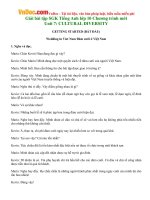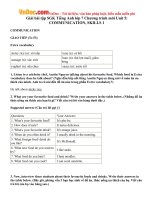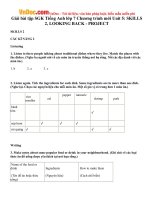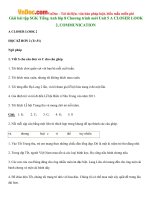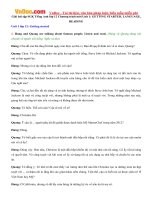Giải bài tập SGK Tiếng Anh lớp 12 Chương trình mới Unit 5: Cultural identity
Bạn đang xem bản rút gọn của tài liệu. Xem và tải ngay bản đầy đủ của tài liệu tại đây (307.79 KB, 19 trang )
VnDoc - Tải tài liệu, văn bản pháp luật, biểu mẫu miễn phí
Getting Started - trang 58 Unit 5 SGK tiếng anh 12 mới
Tổng hợp các bài tập trong phần Getting Started - trang 58 Unit 5 SGK tiếng anh 12 mới
1
Listen and read. (Nghe và đọc)
Mr Brown: Hello everybody. Hope you're all working on your essay on cultural identity. Do you have
any questions?
Van: Yes. I'm not quite sure about how people express their cultural identity.
Mr Brown: That's an interesting question. Can anyone give some examples?
Lam: I think people can do that through the language they speak, the food they eat and ... certain styles
of clothing. For example, some people still wear their traditional costumes so they can preserve their
national identity.
Mr Brown: That's right. It can also be expressed by beliefs and cultural practices.
Yumi: Do you mean people's religious beliefs, music activities and festivals?
Mr Brown: Correct. Any other questions?
Lam: I wonder... why people need to protect their cultural identity.
Yumi: You live here, in your motherland, so you can't see why this is important. But for me, a Japanese
living in Viet Nam, it's essential to understand my family history and traditions.
Van: Interesting. Are your parents both Japanese, Yumi?
Yumi: Yes, but they've been living here for twenty years, and they're afraid that my sister and I are
becoming less and less familiar with our traditions.
Lam: So how do you maintain your culture?
Yumi: Well, we wear kimonos on special occasions and celebrate Japanese festivals such as the cherry
blossom festival. We also eat sushi, sashimi and udon noodles. At home we speak Japanese only.
Van: Do you often go back home?
Yumi: I've been to Kyoto four or five times to visit my grandparents. But to tell you the truth, I don't
know whether Viet Nam or Japan is really my home. My parents are from Japan, but I was born and
grew up here.
Mr Brown: I'd be interested to read about your experiences in Viet Nam in your essay, Yumi. OK, just to
remind you that the essays are due next Wednesday and late submissions won't be accepted.
2 Complete the diagram. (Hoàn thành sơ đồ.)
VnDoc - Tải tài liệu, văn bản pháp luật, biểu mẫu miễn phí
Hướng dẫn:
1. language 2. food
4. beliefs
3. clothing
5. cultural practices
3 Answer the questions. (Trả lời các câu hỏi)
1.
2.
3.
4.
According to Yumi, why do people need to protect their cultural identity?
How do Yumi's family maintain their culture?
Where is home for Yumi?
Give examples of expressions of cultural identity in your community.
Hướng dẫn:
1.
2.
Because it's essential to understand their family history and traditions.
They wear kimonos on special occasions and celebrate Japanese festivals. They eat sushi,
sashimi and udon noodles. They also speak Japanese at home.
3.
She doesn't know whether her home is Japan, where her parents come from, or Viet Nam, where
she was born and grew up.
4.
(Suggested answer) Language: Vietnamese; food: square and. round sticky rice cakes, pho;
clothing: ao dai, ao ba ba; beliefs: ancestor worship (= thờ cúng tổ tiên); cultural practices: Hung Kings'
Festival, Quan ho singing
4
Find the verb or adjective that goes with each of the following nouns or noun phrases. If
necessary, use a dictionary to check the meaning. (Tìm các động từ hoặc tính từ mà đi với các danh từ
hoặc cụm từ sau danh từ. Nếu cần thiết, sử dụng từ điển để kiểm tra ý nghĩa.)
VnDoc - Tải tài liệu, văn bản pháp luật, biểu mẫu miễn phí
1.
2.
3.
4.
5.
________ their cultural identity
________ costumes
________ practices
________ my family history
________ your culture
Hướng dẫn:
1. express / protect
2. traditional
3. cultural
4. understand
5. maintain
5 Read the conversation again and write the correct tenses of the verbs in brackets. (Đọc cuộc trò
chuyện một lần nữa và viết các thì đúng của động từ trong ngoặc đơn.)
1.
2.
My parents (live)____________ here for twenty years.
I (be)_____________ to Kyoto four or five times to visit my grandparents.
Hướng dẫn:
1. have been living
(Note:The present perfect is also possible: ‘My parents have lived ...’)
2. 've been
Language - trang 60 Unit 5 SGK tiếng anh 12 mới
Tổng hợp các bài tập trong phần Language - trang 60 Unit 5 SGK tiếng anh 12 mới
Vocabulary
1 Write the words or phrases given in the box next to their meanings. (Viết những từ hoặc cụm từ
được đưa ra trong các hộp bên cạnh ý nghĩa của chúng.)
assimilate
1.
2.
3.
4.
5.
6.
maintain
national costumes
custom
cultural practices
multicultural
the traditional clothes worn by people from a particular country on special occasions
become part of a country or community by fully integrating into their society or culture
a traditional way of behaving and doing things in a particular society
make something continue in the same way as before
activities related to religion, art, customs, diet, etc.
including people of different races, religions, languages and traditions
VnDoc - Tải tài liệu, văn bản pháp luật, biểu mẫu miễn phí
Đáp án:
1. national costumes
2. assimilate
3. custom
4. maintain
5. cultural practices
6. multicultural
2 Complete the sentences with the correct form of the words in 1. (Hồn thành câu với các hình
thức đúng của từ trong 1.)
1.
2.
3.
4.
5.
6.
Some ethnic groups have strange ___________ such as walking on fire to prevent natural
disasters.
The Vietnamese people still follow the___________of giving lucky money to children during
theTet holidays.
The oo dai, cheongsam, kimono and sari are women's______________ in some Asian countries.
Many ethnic groups find it difficult to ___________their own language or preserve their culture.
People living in a(n)___________ society should learn to respect and understand different
cultural values.
Mgrants may lose their cultural identity as they become _______________ into the new
community.
Hướng dẫn:
1.
2.
3.
4.
5.
6.
cultural practices
custom
national costumes
maintain
multicultural
assimilated
Pronunciation
Assimilation
1 The following phrases are spoken in slow careful speech and in fast, connected speech. Listen
and repeat. Pay attention to the pronunciation of the underlined sounds. (Các từ ngữ dưới đây được
nói trong bài phát biểu cẩn thận chậm và nhanh được kết nối. Lắng nghe và lặp lại. Hãy chú ý đến cách
phát âm của các âm thanh được gạch dưới.)
no assimilation in slow, careful speech
with assimilation in fast, connected speech
a. great culture shock
b. great culture shock
VnDoc - Tải tài liệu, văn bản pháp luật, biểu mẫu miễn phí
a. good cook
b. goodcook
a. garden gate
b. garden gate
a. essay on culture
b. essay on_culture
a. express your opinion
b. express your opinion
a. quiz show
b. quiz show
1.
2.
3.
4.
2 Listen and repeat the following sentences spoken in fast, connected speech. (Nghe và lặp lại
các câu sau đây)
He experienced great culture shock when he firstcame to Europe.
The man in the red car over there is a good cook.
Please don't leave the garden gate open.
You can express your opinions at the end of this show.
5. There's a quiz show on Channel 7 tonight.
Grammar
1 Put the verbs in brackets in the present perfect or present perfect continuous. (Đặt động từ trong
ngoặc ở thì hiện tại hồn thành hoặc hiện tại hoàn thành tiếp diễn.)
Đáp án:
1. have cleaned
2. have been trying
3. has stood
4. has been working, has planted
5. have gone
6. haven't finished
3. Complete the following sentences with the correct form of the words in brackets, using
repeated comparatives. (Hoàn thành các câu sau đây bằng các hình thức đúng của các từ trong
ngoặc đơn, sử dụng so sánh hơn lặp đi lặp lại.)
Đáp án:
1. better and better
2. higher and higher
3. more and more difficult
VnDoc - Tải tài liệu, văn bản pháp luật, biểu mẫu miễn phí
4. faster and faster
5. fewer and fewer
6. more and more
3
Use the information in the table to complete the sentences with repeated comparatives. (Sử dụng
thông tin trong bảng để hồn thành các câu có so sánh hơn lặp đi lặp lại.)
1.
Average Dec.
Jan.
temperatures
High: 6°C High:
in New York
Low: 0°C 4°C
Low:
-2°C
Feb.
2. Petrol price Jan.
Mar.
Feb.
High: 3°C
Low:-4°C
5>2.3/litre $2.5/litre $2/litre
3.
Internet In 2000 2 In 2015 In 2020 4
users in my million 3 million million
city
4. Josh's car 50 km/h 70 km/h 100 km/h
speed
5.
ABC Jan.
Supermarket's
50,000
customers
Apr.
Sept.
35,000
25,000
Hướng dẫn:
1. is becoming colder and colder
3. More and more people
2. are becoming lower and lower
4. was driving faster and faster
5. Fewer and fewer customers
no assimilation in slow, careful speech
with assimilation in fast, connected speecr
a. great culture shock
b. greatjculture shock
a. good cook
b. goodcook
a. garden gate
b. garden gate
a. essay on culture
b. essay on_culture
a. express your opinion
b. express your opinion
VnDoc - Tải tài liệu, văn bản pháp luật, biểu mẫu miễn phí
a. quiz show
b. quiz show
Skills - trang 62 Unit 5 SGK tiếng anh 12 mới
Tổng hợp các bài tập trong phần Skills - trang 62 Unit 5 SGK tiếng anh 12 mới
READING
Cultural identity in modern society
1
Use a dictionary to find the meaning of the words or phrases in the box. Then complete the
sentences with their correct form. (Sử dụng từ điển để tìm ra ý nghĩa của các từ hoặc cụm từ trong hộp.
Sau đó hồn thành câu với hình thức đúng của chúng.)
integrate
for granted
1.
2.
3.
4.
aspect
cultural identifier
He had taken it__________ that his friend would tell the truth.
________ are characteristics shared by individuals belonging to the same group or community.
When he studied abroad, he successfully ________ into the local culture.
His book covers all _______ of a migrant's life.
Đáp án:
1. for granted
2. Cultural identifiers
3. integrated
4. aspects
2 Read the passage about cultural identity. Four sentences have been removed from the passage.
Choose a sentence (a-d) to complete each gap (1-4). (Đọc đoạn văn về bản sắc văn hóa. Bốn câu đã
được gỡ bỏ từ đoạn văn. Chọn một câu (a-d) để hoàn thành mỗi khoảng trống (1-4).)
a. On the other hand, there are people who choose to abandon their heritage culture and assimilate into
the new culture of the majority.
b. Cultural identity is usually understood as the identity or feeling of belonging to a group that has its
own culture.
c. However, people often do not confine themselves to one culture.
d. The first stage, known as unexamined cultural identity, occurs during childhood, when culture is taken
for granted.
There are various studies on cultural identity. (1)___________________ . Individuals usually define
themselves by cultural identifiers such as nationality, ethnicity, location, history, language, gender,
beliefs, customs, clothing and food.
VnDoc - Tải tài liệu, văn bản pháp luật, biểu mẫu miễn phí
It is suggested that cultural identity develops in three stages. (2)__________________________ .
Cultural ideas and values provided by families, communities or the media are easily accepted without
much critical thinking. In the second stage, called the cultural identity search, teenagers may become
more curious, and willing to explore, analyse and compare their beliefs with other cultures. When people
develop a clear sense of cultural identity, know which social group they belong to and feel satisfied with
their cultural identity, they reach the final stage called cultural identity achievement.
Living in their own country, people can easily acquire and maintain their cultural identity because they
are fully exposed to different aspects of their native culture. They inherit their ancestors' history,
knowledge, language, beliefs, values, and customs, which have been passed from one generation to the
next one.
(3) ____________________ . In the age of globalisation, access to the Internet and the media provides
instant contact with many cultures. A person's cultural identity may be influenced by certain aspects of
other cultures.
When people move to a new culture, they may react differently. Some people feel a strong urge to keep
their cultural identity, so they continue speaking their language, cooking their food, wearing their
traditional clothing, and celebrating their festivals. They also insist that their children and grandchildren
maintain their
cultural identity. (4) __________________________ . Yet, there are people who integrate into the new
cultural environment while keeping their own cultural identity and flexibly adjusting to the different
aspects of the new culture.
Đáp án: 1.b
3
2.d
3.c
4. a
Read the passage again and answer the questions.
1.
2.
3.
4.
How do individuals define themselves?
What happens in the first and the second stages of the formation of cultural identity?
When do people reach the final stage?
Why can people's cultural identity be affected by other cultures even if they live in their native
country?
5.
What are the three ways people react when they move to a new culture?
Hướng dẫn:
Đọc bài lại lần nữa và trả lời các câu hỏi.
1.
They define themselves by (cultural identifiers such as) nationality, ethnicity, location, history,
language, gender, beliefs, customs, clothing and food.
2.
In the first stage, children take culture for granted, and accept cultural ideas and values without
much critical thinking. However, in the second stage, teenagers may become more curious, and willing
to explore, analyse and compare their beliefs with other cultures.
3.
When they develop a clear sense of cultural identity, know which social group they belong to,
and feel satisfied with their cultural identity.
4.
Because access to the Internet and the media provides instant contact with many cultures.
VnDoc - Tải tài liệu, văn bản pháp luật, biểu mẫu miễn phí
5.
First, they keep their cultural identity. Second, they assimilate into the new culture of the
majority. Third, they integrate into the new cultural environment (keeping their cultural identity and
flexibly adjusting to the different aspects of the new culture).
4 What should you do to develop your cultural identity in today's modern society? Discuss with
a partner.
Bạn nên làm gì để phát triển bản sắc văn hóa của mình trong xã hội hiện đại ngày nay? Thảo luận với
một người bạn.
SPEAKING
Maintaining cultural identity
1 Work with a partner. Discuss and decide if activities (1-4) can help people to maintain their
cultural identity. Match each of them with its reasons (a-d). (Làm việc cùng người bạn. Thảo luận và
quyết định nếu hoạt động (1-4) có thể giúp mọi người để duy trì bản sắc văn hóa của họ. Khớp hoạt
động với lý do của nó (a-d).)
Activities
Reasons
1. preserving native language
a. represents national identities; reflects climatic
conditions
2. wearing traditional clothing
b. gives big appetites and adequate nutrition;
strengthens cultural ties
3. celebrating traditional holidays
c. develops intellectual abilities; shapes cultural
identity
4. eating traditional food
d. offers a sense of being rooted in native
culture; brings people together
Đáp án: 1.c
2.a
3.d
4.b
2 Use ideas in 1 to fill each of the numbered spaces in the following conversation. Then practise
it in groups of three. (Sử dụng ý tưởng trong 1 để điền vào mỗi dấu cách được đánh số trong cuộc trị
chuyện sau đây. Sau đó, luyện tập nó trong nhóm ba người.)
Hướng dẫn:
1.
2.
preserve their native language
cultural identity
VnDoc - Tải tài liệu, văn bản pháp luật, biểu mẫu miễn phí
3.
4.
develop their intellectual abilities
shape their cultural identity
3 Have a similar conversation discussing what you should do to maintain cultural identity in the
age of globalisation.
Tạo một cuộc trò chuyện tương tự thảo luận về những gì bạn nên làm để duy trì bản sắc văn hố trong
thời đại tồn cầu hóa.
LISTENING
Cultural diversity in Singapore
1
You are going to listen to a talk about cultural diversity in Singapore. What do you know
about this city-state? Look at the information below. Guess and write the name of each ethnic
group in the blank. (Bạn sẽ nghe một cuộc nói chuyện về sự đa dạng văn hóa tại Singapore. Bạn biết gì
về thành phố-bang này? Xem các thơng tin dưới đây. Đốn và viết tên của từng dân tộc vào chỗ trống.)
Đáp án:
1. Eurasians and other
2 Indians
3. Malays
4.Chinese
2 Work in pairs. Discuss and match the national costumes with their names. (Làm việc theo cặp.
Thảo luận và khớp trang phục dân tộc với tên của họ.)
1.
2.
3.
4.
Indian sari
Malay baju kurung
Chinese cheongsam
Malay baju melayu
Đáp án:
1.d
2. a
3.c
4. b
3 Listen to a talk. What is the speaker about? Tick the correct boxes. (Nghe một cuộc nói chuyện.
Người nói nói về là gì? Đánh dấu vào các ơ đúng.)
1.
2.
3.
4.
5.
6.
Singapore's ethnic groups and official languages
Singapore's traditions and official languages
Chinese wedding costumes in Singapore
Malay traditional costumes for men and women
Modern Indian costumes for men
The Indian traditional dress
Đáp án: Người nói nói về 2, 4, 6
VnDoc - Tải tài liệu, văn bản pháp luật, biểu mẫu miễn phí
4
Listen again and complete the following sentences. Fill each blank with no more than four
words or numbers. (Nghe một lần nữa và hoàn thành các câu sau. Điền vào mỗi chỗ trống với không
quá bốn chữ hoặc số.)
Đáp án:
1.
2.
3.
4.
5.
6.
9 August 1965
wear their traditional clothing
Chinese men and women
hung over the shoulder
long-sleeved blouses
as Singaporeans first
5 Work in pairs. Ask and answer the following question.
What else do you know about the city-country and its culture?
Hướng dẫn:
Làm việc theo cặp. Hỏi và trả lời câu hỏi sau đây.
Cịn gì nữa làm bạn biết về các thành phố quốc gia và nền văn hóa của nó?
Audio script
Singapore gained its independence on 9 August 1965 and now has a population of more than five
million people including Chinese, Malays, Indians and Eurasians. The country has four official
languages: English, Chinese, Malay and Tamil. Singapore does not have a national costume, as people
from the different ethnic groups tend to wear their traditional clothing.
The Chinese traditional attire for ladies is called cheongsam, which means a long garment. Originally,
both men and women used to wear this long, one-piece dress specially designed to conceal the body
shape. Today it's often worn by Chinese women in Singapore during Chinese New Year celebrations and
at traditional wedding ceremonies.
For Malay men, the traditional garment is called baju melayu.
It consists of a loose shirt and a sarong worn over a pair of trousers. Malay women often wear baju
kurung, which looks like a long- sleeved and collarless blouse worn over a long skirt.
The traditional dress for Indian women is thesari, which can be not only worn on special occasions, but
used every day. It's a long piece of brightly-coloured cloth wrapped around the waist and hung over the
shoulder. It's usually decorated with beautiful patterns.
Because of the hot temperatures and the modern character of Singapore, clothing is usually very casual
and most people prefer western fashions. For business, men usually wear dark trousers, white shirts and
a tie. Standard office attire for women includes a long-sleeved blouse with trousers or a skirt.
Unified by the common goal for a better future, the people of Singapore, especially the younger
generations, think of themselves as Singaporeans first, and then as Chinese, Malay or Indian.
WRITING
VnDoc - Tải tài liệu, văn bản pháp luật, biểu mẫu miễn phí
What makes me Vietnamese
1 Work in pairs. Give the reasons why language is often considered the most important cultural
identifier.
Example:
Language is the most important cultural identifier because it allows me to communicate with my family
and community.
Hướng dẫn:
Làm việc theo cặp. Đưa ra những lý do tại sao ngôn ngữ thường được coi là cách nhận dạng văn hóa
quan trọng nhất.
Thí dụ:
Ngơn ngữ là cách nhận dạng văn hóa quan trọng nhất bởi vì nó cho phép tơi giao tiếp với gia đình và
cộng đồng của tơi.
2 Read the following essay on language as defining a person's cultural identity. Complete the
essay, using the correct form of the words in the box. (Đọc bài tiểu luận sau đây về ngôn ngữ như là
cách xác định bản sắc văn hóa của một người. Hồn thành bài tiểu luận, sử dụng hình thức đúng của các
từ trong hộp.)
Đáp án:
1. expressing
2. demonstrated
3. features
4. unite
5. share
6. invaded
7. unifying
8. unique
3
Which is the most important cultural identifier or the feature that defines your cultural
identity? First, discuss your ideas in groups of four. Then decide on the most important feature
and write an essay of 180-250 words.
You can choose one of the following cultural identifiers:
Festivals and cultural practices
Shared values and beliefs
Traditional food
History
Education
VnDoc - Tải tài liệu, văn bản pháp luật, biểu mẫu miễn phí
Hướng dẫn:
Đâu là cách nhận dạng văn hóa quan trọng nhất hoặc tính năng xác định bản sắc văn hóa của bạn? Đầu
tiên, thảo luận về ý tưởng của bạn trong nhóm bốn người. Sau đó quyết định những tính năng quan trọng
nhất và viết một bài luận trong 180-250 từ.
Bạn có thể chọn một trong các bộ nhận dạng văn hóa sau đây:
• Lễ hội và tập qn văn hóa
• giá trị và niềm tin chung
• Món ăn truyền thống
• Lịch sử
• Giáo dục
Gợi ý:
Some people believe cultural identity is how we identify ourselves as part of a culture.This can simply
be done through the language we use, the food we often have, or the clothing we often wear on special
occasions. In my opinion, festivals and cultural practices celebrated and preserved years after years are
the most important cultural identifiers.
Through festivals, we want to express our unity as well as cultural identifier. Originally, festivals are
special occasions when people at a particular place stop working in order to celebrate parties or events.
They are often connected with religious beliefs of a specificgroupofpeopletothankGodsand ancestors for
good harvests, fortune, and happiness.
Along with festivals, cultural practices are unique ways of expressing who we are and what country or
culture we belong to. These are traditionally considered the right things to do in a community. For
example, Vietnamese people usually go to pagodas on first days of New Year to pray for good health
and happiness. Although we are now in modern time, these traditions are well preserved respectably as a
cultural stereotype.
As people all over the world become closer and closer, we share our festivals and cultural practices
the most important features. We organise international festivals and take part in various kinds of
cultural events in other countries. This is always the meaningful way of identifying, sharing and
preserving cultures.
Communication and Culture - trang 66 Unit 5 SGK tiếng anh 12 mới
Tổng hợp các bài tập có trong phần Communication and Culture - trang 66 Unit 5 SGK tiếng anh 12 mới
Communication
Migration and cultural identity
1 Listen to a talk by Mr Ben Wilson, a sociologist and psychologist, about preserving migrants'
cultural identity. Answer the questions.
1.
What are migrants encouraged to do in a multicultural society?
VnDoc - Tải tài liệu, văn bản pháp luật, biểu mẫu miễn phí
2.
3.
What do migrants want to do when they settle down in a new culture?
Summarise the two ways for migrants to pass down their culture to the next generation.
Hướng dẫn:
Nghe một cuộc nói chuyện của ơng Ben Wilson, một nhà xã hội học và tâm lý học, về giữ gìn bản sắc
văn hóa của người di cư. Trả lời các câu hỏi.
1.
2.
3.
They are encouraged to maintain their cultural identity.
They want to assimilate into the new culture, but they also want to maintain their own culture.
The first way: encouraging all family members to speak the mother tongue at home; travelling to
the home country regularly.
The second way: attending festivals celebrating the migrants'culture.
Audio script
The topic of my talk today is the problems many migrants have to face when living in a place which is
not their homeland. Migrants can be immigrants who settle down in another country. But migrants can
also be those people moving from one place to another within the same country, like... moving from the
countryside to the city.
In a multicultural society like ours, migrants are encouraged to maintain their own cultural identity.
When people migrate, they do not leave their beliefs, customs or cultural practices behind. They want to
assimilate into the new culture, but they also want to maintain their own. However, their children and
grandchildren, I mean the next generations, find it difficult.
There are mainly two ways for migrants to pass down their culture to the next generation. First, they
should encourage all family members to speak the mother tongue at home. This will help the young ones
to communicate with people in the home
country when they have a chance to visit their homeland, in s also means that it's necessary to travel to
the home country regularly. There is no better way to learn about a culture than to experience it
first-hand. Second, they should attend festivals celebrating their culture, such as the Lunar New Year for
some Asian communities. On these occasions, everybody can enjoy traditional food, wear traditional
clothes, sing folk songs, and exchange best wishes in the heritage language. People will have a chance to
get together, and maintain and further develop their sense of cultural identity.
2 Discuss the question with a partner.
What should people do to preserve their cultural identity when they move to a new place?
Hướng dẫn:
Thảo luận về các câu hỏi với một người bạn.
mọi người nên làm gì để giữ gìn bản sắc văn hóa của họ khi họ di chuyển đến một nơi ở mới?
Gợi ý trả lời:
When people move to a new place, they can preserve their cultural identity by
VnDoc - Tải tài liệu, văn bản pháp luật, biểu mẫu miễn phí
organising and participating in traditional festivals or practices in their community,
cooking traditional food for the family,
teaching children to speak their native language at home.
Culture
Festivals
1
Read the text about celebrations of some ethnic groups in Viet Nam. Write the names of the
festivals under the pictures. (Đọc văn bản về lễ kỷ niệm của một số dân tộc ở Việt Nam. Viết tên của
các lễ hội dưới hình ảnh.)
Festivals are celebrated to highlight the cultural heritage of nations. At national level, festivals help to
strengthen the spirit of solidarity and unity of the whole nation. Regional festivals or festivals of an
ethnic group, on the other hand, help to maintain the cultural identity of a community. Taking part in
different activities of the festival, group members get together, have fun, and promote their cultural
image. Examples can be found in well-known festivals of some ethnic groups in Viet Nam.
In March, the Elephant Racing Festival is held at Don Village, in Dak Lak Province, to promote the
martial spirit of the M'Nong and Ede people, who are famous for their bravery in wild elephant hunting.
Every year, more and more participants in colourful costumes flock to the area to watch the race and
take part in other fun activities such as eating traditional food, drinking rice wine, dancing, and watching
elephants play soccer.
Forest Worshipping is an important festival of the Nung and Dao people in Ha Giang and Lao Cai
Provinces, which takes place in thefirst lunar month. People worship the god of trees and villagers who
sacrificed their lives to protect the village.They also pray for good health, fruitful trees and favourable
climate. The ceremony is held under an old tree in the forest, with a lot of agricultural products used as
offerings. After the ceremony, local people sign a statement to protect forests and plant more trees
around their houses. Finally, they take part in folk games with strong ethnic identity, such as blind man's
buff, swinging, shuttlecock throwing, and tug of war.
Đáp án:
a
Elephant Racing Festival
b
Forest Worshipping Festival
2 Read the text again and complete the table. (Đọc văn bản một lần nữa và hoàn thành bảng.)
Đáp án:
Location
Elephant Racing Festival
Forest Worshipping Festival
Dak Lak Province
Ha Giang and Lao Cai Provinces
VnDoc - Tải tài liệu, văn bản pháp luật, biểu mẫu miễn phí
Time
annually, in March
the first lunar month
Ethnic
groups
M'Nong and Ede
Nungand Dao
Purpose
to promote the martial spirit of the to worship the god of trees and villagers
M'Nong and Ede people
who sacrificed their lives to protect the village
- to pray for good health, fruitful trees and
favourable climate
Activities
- watching elephant race
- offering agricultural products
- eating traditional food and drinking - signing a statement to protect forests and
rice wine
plant trees
- dancing
- playing folk games
- watching elephants play soccer
3
Discuss the question with a partner.
Have you ever attended any ethnic cultural festivals in Viet Nam?
a. If yes, tell your partner where, when, how and why the festival was celebrated.
b. If no, do you want to attend any? Why or why not?
Hướng dẫn:
Thảo luận các câu hỏi với một người bạn.
Bạn đã bao giờ tham dự bất kỳ lễ hội văn hóa dân tộc ở Việt Nam?
a. Nếu có, hãy nói cho người bạn của bạn ở đâu, khi nào, như thế nào và tại sao các lễ hội được tổ chức.
b. Nếu khơng có, bạn có muốn tham gia không? Tại sao hoặc tại sao không?
Looking back - trang 68 Unit 5 SGK tiếng anh 12 mới
Tổng hợp các bài tập trong phần Looking back - trang 68 Unit 5 SGK tiếng anh 12 mới
Pronunciation
1 Underline the sounds that can be affected by assimilation. (Gạch dưới những âm thanh có thể bị
ảnh hưởng bởi sự đồng hóa.)
1.
We took a lot of pictures of the Grand Canyon and the Golden Gate Bridge during our trip to the
US.
2.
In her dress shop, Alice showed us traditional dresses and some nice shoes.
VnDoc - Tải tài liệu, văn bản pháp luật, biểu mẫu miễn phí
3.
4.
5.
Where's your credit card, Tom?
Indian cuisine had gained popularity in Canada before Indian immigrants settled there.
People living in a foreign country don't want to be treated as second-class citizens.
Đáp án:
1.
2.
3.
4.
5.
Grand Canyon, Golden Gate
dress shop, Alice showed, nice shoes
Where's your, creditcard
Indian cuisine, had gained, in Canada
foreign country, second-class
2
Listen and repeat the sentences in 1. (Nghe và nhắc lại các câu trong phần 1)
Vocabulary
Complete the sentences with the correct form of the words or phrases in the box.
Hoàn thành câu với hình thức đúng của từ hoặc cụm từ trong hộp.
Đáp án:
1 preserve
2. cultural identity
3. cultural practices
5. solidarity
4. national pride
6. national costume
Grammar
1
Read the exchanges. Put the verbs in brackets in the present perfect or present perfect
continuous. Use the passive voice if necessary. (Đọc trao đổi. Đặt động từ trong ngoặc ở thì hiện tại
hồn hoặc hiện tại hồn thiện tiếp diễn. Sử dụng thể bị động nếu cần thiết.)
Đáp án:
1.
2.
has become, have continued, has been working
have never seen, have worn, has even become
2
Read the situation and complete Andy's statements about himself, using repeated
comparatives. (Đọc tình huống và hồn thành các báo cáo của Andy về bản thân mình, sử dụng so sánh
hơn lặp đi lặp lại.)
Đáp án:
2.lower and lower
3. more and more difficult
4. more and more complicated
5. more and more
6. less and less
VnDoc - Tải tài liệu, văn bản pháp luật, biểu mẫu miễn phí
Project - trang 69 Unit 5 SGK tiếng anh 12 mới
Vận dụng kiến thức đã học để làm các bài tập trong phần Project - trang 69 Unit 5 SGK tiếng anh 12
mới
1 Work in groups of four or five. Choose one ethnic group in Viet Nam. Look for information
about the features that define the group's cultural identity.
Suggested ethnic groups:
•
the Rhade (or Ede) in Central Highlands
•
the Cham in central Viet Nam and An Giang Province
•
the Tay in northern Viet Nam
Hướng dẫn:
Làm việc trong nhóm bốn người hoặc năm người. Chọn một nhóm dân tộc ở Việt Nam. Tìm thông tin về
các đặc điểm xác định bản sắc văn hóa của nhóm.
nhóm dân tộc gợi ý:
• Rhade (hay Ê Đê) ở Tây Nguyên
• Chăm ở miền Trung Việt Nam và tỉnh An Giang
• Tày ở miền Bắc Việt Nam
2 Design a poster to introduce the ethnic group. Add pictures to make it more attractive. Include
the information about:
Population
Region(s) with significant population
Language
Religion and beliefs
Clothing
Traditional food and drink
Festivals and music
Hướng dẫn:
Thiết kế một poster giới thiệu nhóm dân tộc. Thêm hình ảnh để làm cho nó hấp dẫn hơn. Bao gồm thơng
tin về:
• Dân số
• Tỉnh với dân số đáng kể
• Ngơn ngữ
• Tơn giáo và tín ngưỡng
• Quần áo
VnDoc - Tải tài liệu, văn bản pháp luật, biểu mẫu miễn phí
• thực phẩm truyền thống và đồ uống
• Lễ hội và âm nhạc
3 Introduce your poster to the class and give a presentation on the cultural features of the ethnic
group.
Giới thiệu poster của bạn đến lớp và đưa ra một bài thuyết trình về những nét văn hóa của dân tộc.

